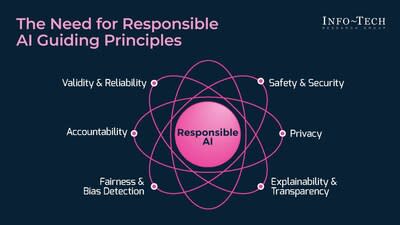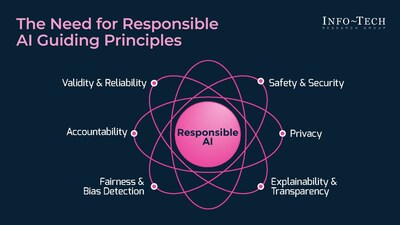Info-Tech Research Group's latest research explores the ethical integration of artificial intelligence in policing and provides important strategies to address challenges such as data privacy, bias, and social trust. A newly published blueprint provides actionable insights that enable law enforcement agencies to increase operational efficiency and accountability through responsible AI practices, ensuring public safety while upholding ethical standards.
Toronto, May 17, 2024 /CNW/ – As law enforcement agencies increasingly adopt artificial intelligence, ensuring the ethical and responsible use of AI technology has never been more urgent. As concerns about data privacy, bias, and social trust grow, a new blueprint from Info-Tech Research Group Responsible use of AI in policingprovides a timely and comprehensive guide for law enforcement leaders. This blueprint addresses the complexities of AI integration and provides strategies to foster public trust through data curation, transparency, bias reduction, and stakeholder engagement. By implementing these practices, government agencies can increase accountability and ensure that AI serves as a valuable tool in modern policing.


”The responsible use of AI in policing and public safety is a multifaceted issue that encompasses several key areas, including data privacy, safety and security, explainability and transparency, fairness and bias detection, validity and reliability, and accountability.” To tell neil rosenblattChief Research Director, Information Technology Research Group. ”Each of these areas has its own set of challenges, and specific efforts to ensure that AI technologies are used ethically and effectively in ways that respect individual rights and promote public trust. is required.”
Info-Tech's blueprint emphasizes the importance of responsibly incorporating AI into modern policing. By using AI for enhanced data analysis, predictive policing, and resource allocation, law enforcement agencies can significantly improve the efficiency and effectiveness of their operations. The company's research prioritizes ethical considerations such as robust data governance, transparent AI processes, and active community engagement, and promotes a structured AI implementation approach. These strategies will help police build public trust, strengthen accountability, and achieve better public safety outcomes.
“The responsible use of AI in policing requires a comprehensive approach that addresses these critical areas through continuous improvement, stakeholder engagement, and adherence to ethical, legal, and social standards. is.” explains Rosenblatt. ”By addressing the challenges and implementing initiatives outlined in this study, law enforcement agencies can leverage AI technology to improve public safety while respecting privacy, ensuring security, and promoting fairness and transparency. can be strengthened.”
The company's research details how responsible AI integration can transform law enforcement practices, highlighting the need for seamless and strategic implementation. This process involves continuous improvement that not only adapts to technological advances, but also aligns with public safety goals. By incorporating AI technology into core police operations, agencies can significantly improve the accuracy of data analysis, predictive policing, and resource management. This approach allows law enforcement agencies to keep up with technological advances while maintaining ethical standards and improving public trust.
The fundamental principles of responsible AI are essential to the development and deployment of AI models that take human-based principles into account. According to the Info-Tech Blueprint, without these principles, the consequences of AI use can be very negative for both individuals and organizations delivering AI applications. The study highlights his six fundamental principles that IT leaders should consider for responsible AI implementation.
-
Safety and security – AI models must be safe, secure to use, and robust to prevent misuse and ensure operational integrity.
-
Privacy – Individual privacy, personal data and relevant regulations must be respected, protected and complied with.
-
Explainability and transparency – Predictions and decisions should be explainable, allowing stakeholders to understand and build trust in the AI process.
-
Fairness and bias detection – Data must be unbiased to generate unbiased predictions, represent the population, and address potential discrimination.
-
Accountability – Individuals or organizations must take responsibility for decisions based on the model and ensure oversight and ethical use.
-
Validity and reliability – AI systems must maintain consistency and accuracy across a variety of scenarios to ensure they behave as expected.
Info-Tech's blueprint emphasizes the need for responsible AI implementation in policing to increase operational effectiveness and public trust. By adopting these guiding principles, law enforcement can ensure the ethical use of AI that respects privacy and reduces bias. This approach not only addresses current challenges, but also prepares agencies for future advances. By investing in responsible AI practices, law enforcement agencies can achieve sustainable and impactful improvements and strengthen their commitment to ethical standards and community trust in an exponentially evolving technological environment.
For exclusive and timely commentary on this topic from Info-Tech analysts and access to the complete documentation, please visit Responsible use of AI in policing blueprint, Please contact pr@infotech.com.
Infotech LIVE 2024
Registration is now open for Info-Tech Research Group's annual IT conference, Info-Tech LIVE 2024 September 17-19, 2024at the iconic Bellagio Las Vegas. This premier event provides journalists, podcasters, and media influencers with exclusive content, access to the latest IT research and trends, and the opportunity to interview industry experts, analysts, and speakers. To request a media pass to attend an event or access research and expert insights on trending topics, please contact pr@infotech.com.
About Information Technology Research Group
Info-Tech Research Group is one of the world's leading research and advisory firms, serving more than 30,000 IT and HR professionals. The company produces unbiased, relevant research and provides advisory services to help leaders make strategic, timely, and informed decisions. For nearly 30 years, Info-Tech has worked closely with teams to provide them with everything they need, from practical tools to analyst guidance, delivering tangible results for their organizations. has been reliably provided.
For more information about the Info-Tech division, please visit: MacLean & Company For HR research and advisory services, SoftwareReviews provides software purchasing insights.
Media professionals can sign up for unlimited access to research and hundreds of industry analysts across IT, HR, and software through the company's Media Insiders program. For access, please contact pr@infotech.com.
For information and access to the latest research on Info-Tech Research Group, visit infotech.com and connect via LinkedIn. X.


View original content to download multimedia: https://www.prnewswire.com/news-releases/ai-in-policing-info-tech-research-group-publishes-guide-for- ethical-ai-integration-for-law -enforcement agency-302149226.html
SOURCE Information Technology Research Group
View original content to download multimedia: http://www.newswire.ca/en/releases/archive/May2024/17/c4294.html


